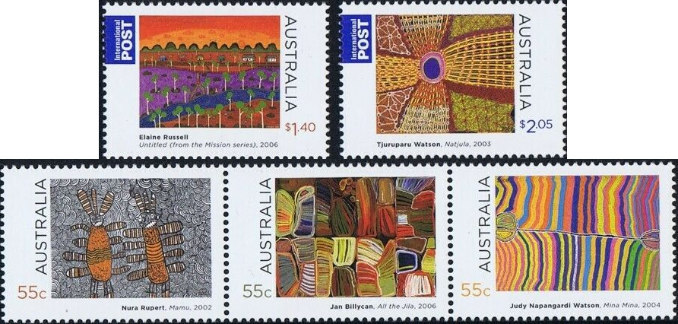History
Timeline results for 2000 to 2010
Found 215 results for your search. Showing page 8 of 11.
Year from 2000, year to 2010
2009
-
The Northern Territory releases its first-ever policy for homelands and outstations, setting out how the government intends to provide services and infrastructure to assist communities living on Aboriginal-owned lands. ⇒ Aboriginal homelands
-
Italy and Australia sign a repatriation agreement.
-
During the 2009 swine flu outbreak, Aboriginal people make up 11% of all identified cases, 20% of hospitalisations and 13% of deaths. [1] There were 3.2 times more Aboriginal people admitted to hospital than non-Aboriginal people, 4 times as many admissions to intensive care units and 4.5 times the number of deaths.
-
The Football Federation Australia announces a ten-year Indigenous Football Development Program to give soccer a higher profile in the Indigenous community and to lift the percentage of Indigenous players in the sport’s elite level.
-
Booth Museum of Natural History, Brighton, Britain promises to repatriate two skulls and two thigh bones, donated almost 100 years ago [2]. The museum also holds a Ngarrindjeri skull which has been turned into a water carrier and is considered 'extremely rare' [3]. The skull is with the museum since 1925 when it was donated by a local collector.

Booth Museum of Natural History, Brighton. Even small museums hold Aboriginal remains which were often donated by private collectors. -
The NT government rules that the first four hours of education in all NT schools will be delivered in English, putting an end to 34 years of bilingual education in the Northern Territory by ending the nine remaining bilingual programs.
-
The Western Australian government announces the formation of the Indigenous Implementation Board to improve social and economic outcomes for Aboriginals. The nine-member board aims to ‘enhance Indigenous involvement in local decision-making and strengthen corporate and non-government contribution to Indigenous affairs’. Members are chosen for their expertise, not as representatives.
-
Aboriginal law professor Mick Dodson receives the 2009 Australian of the Year award for his lifetime commitment to improving the lives of Aboriginal people and helping to close the gap between Indigenous and non-Indigenous Australians.
-
The Northern Territory government and traditional owners settle one of the longest native title claims over the Cox Peninsula, about 30 kms west of Darwin. 80% of the area will be designated Aboriginal land for the Larrakia people.
-
Reconciliation Australia releases the Australian Reconciliation Barometer, a first-ever study on how Aboriginal and other Australians see and feel about each other.
-
The Australian government promises to establish the Aboriginal and Torres Strait Islander Healing Foundation which will deal with the "trauma experienced by all Aboriginal people as the after-effect of colonisation" [4], but with a particular focus on the Stolen Generations.
The foundation won't deliver healing services, instead it will fund healing work, educate communities and social workers and evaluate healing programs to find out what works.
-
The Federal Court makes the largest native title determination in South Australia’s history when it regognises rights of the Adnyamathanha people to land in and around the Flinders Ranges.
-
The NSW government changes the Aboriginal Trust Fund Repayment Scheme to allow a panel consider larger payouts and take into account non-documentary and oral evidence when considering applications.
-
Australia Post releases five stamps featuring paintings by five Aboriginal artists: Nura Ripert (Mamu), Jan Billycan (All the Jila), Judy Napangardi Watson (Mina Mina), and for the international stamps Elaine Russell (Untitled [Mission Series]) and Tjuruparu Watson (Natjula).

The works of five Aboriginal artists represent Aboriginal culture on national and international stamps. -
The Human Rights Committee report on Australia recommends the government "adopt a comprehensive national mechanism to ensure that adequate reparation, including compensation, is provided to the victims of the Stolen Generations policies" [5]. The Federal-Attorn General decides not to follow that recommendation and rules that no challenge to this decision be allowed.
-
Contrary to the UN Declaration on the Rights of Indigenous Peoples, which states that all Aboriginal people have the right to self-determination, the government under the NT intervention dictates how Aboriginal people have to run aspects of their lives.
-
Australia supports the United Nations Declaration on the Rights of Indigenous Peoples (UNDRIP). The Howard government had rejected the declaration fearing a separate customary law.
-
The Australian government allocates the largest amount of funding for a single year in the history of federal budgets to Indigenous affairs: A$4.8 billion. The biggest single item with A$106 million is for the Canberra bureaucracy to manage the income of Aboriginal people under the Northern Territory intervention.
-
Federal and Northern Territory governments respond to the NTER Review Board recommendations.
-
The Federal government announces a proposal to compulsorily acquire Alice Springs town camps.
References
View article sources (5)
[1]
'Indigenous coronavirus taskforce meets as remote communities restrict access', The Guardian 6/3/2020
[2]
'Coming home', Koori Mail 442 p.14
[3]
'Government urges Aboriginal skull return', Koori Mail 445 p.19
[4]
'Healing moves a step nearer', Koori Mail 445 p.12
[5]
'Stolen Generations' right to reparation', Koori Mail 458 p.21

